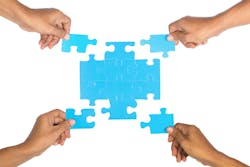Grants to Align COVID Relief Planning, Multi-Sector Data Sharing
Data Across Sectors for Health (DASH) has given grant funding to organizations in five states to support community partnerships with state or local governments to leverage COVID-19 relief funds to advance policies for data sharing and data integration efforts.
Led by the Illinois Public Health Institute and the Michigan Public Health Institute, DASH is a National Program Office of the Robert Wood Jonson Foundation. It supports collaborations that work together to improve the health of their communities, promote health equity, and contribute to a culture of health by strengthening information-sharing systems, engaging additional sectors and community members, and building sustainable capacity to work collaboratively toward community goals.
The awards are a part of a DASH’s Learning and Action in Policy and Partnerships (LAPP) program led in partnership with the Center for Health Care Strategies. They are tied to DASH’s work to connect information systems and share data across sectors. Historically disjointed data sharing across healthcare, public health, social services, and other sectors beyond health has hindered the coordination of equitable, community-driven health improvement efforts.
Each of the five projects will receive $80,000. Awardees include:
• Nebraska (led by Cync Health): Developing a Roadmap for Democratizing Data for Housing and Homelessness Leveraging COVID-19 Funding
• New Mexico (led by the Center for Health Innovation): Support for Creation of Statewide Food, Hunger, and Farm Data Infrastructure to Address Hunger and Food and Water Insecurity Worsened by COVID-19
• Georgia (led by ARCHI (Atlanta Regional Collaborative for Health Improvement)): Invert the Burden: How to Build a More Equitable Service Access System to Address Persistent Inequities in Metro Atlanta
• Utah (led by San Juan County): Removing Barriers Utilizing Greater Digitization to Advance Navajo Elder Services in Coordinating Truly Wraparound Care and Services in San Juan
• Connecticut (led by Connecticut Data Collaborative, CT DATA) Hartford Data Collaborative Behavioral Health Indicators for City Youth
DASH notes that leveraging the power and influence of state agencies is a key opportunity to support and amplify existing community relationships and data sharing initiatives, while simultaneously helping states achieve their goals related to improving population health and health equity.
This is the second round of LAPP funding. In 2021, DASH began the program with six states that are using funds, resources, and technical assistance to enhance community data-sharing capabilities and foster relationships between state government, community-based organizations, and community members.
The Washington State Department of Social and Health Services was a round-one grantee. “Evolving state data systems to reflect community-led definitions of well-being is essential to achieve a just and equitable future,” said Lori Pfingst, senior director in the Office of the Secretary at Washington DSHS, in a statement. “The LAPP/DASH partnership is supporting Washington in creating a state culture and process that values the expertise of people and communities historically excluded from well-being in decision-making.”
With the LAPP program, DASH hopes to continue its core support of multi-sector collaboration and data sharing efforts and leverage these lessons to identify powerful policy and system change opportunities. The LAPP initiative was developed with guidance from federal and state officials, community-based organization leaders, subject matter experts, and community members.


